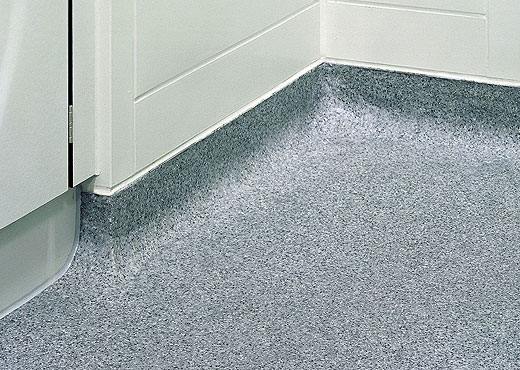
When it comes to industrial flooring, different industries have different needs. Breweries, pharmaceutical, commercial kitchens, laboratories, parking garages, and aviation – to name a few – need their floors to be able to withstand all sorts of stress. Synthetic resin quartz flooring is desirable in nearly any industrial flooring application because of the quartz granules’ natural functional qualities as a filler. Our quartz sand granules also lend themselves to engineering and further innovation to provide functionality many people wouldn’t normally think could come from sand: chemical resistance, thermal shock resistance, slip resistance, abrasion resistance, ease of cleaning, and visual appeal. When the sand is in the right shape, it can also help manufacturers save money on expensive binders.
We have partnered with Germany-based Dorfner Group, refiners of kaolin and crystalline quartz sand who have been in operation for over 100 years, to bring their variety of engineered functional fillers to industrial flooring manufacturers in North America.
Here are five interesting facts about synthetic resin quartz flooring:
1. Quartz sand provides a naturally slip resistant surface
A coating of engineered quartz granules sprinkled over the surface of a floor provides the basis for a non-skid coating. With so many different grain sizes available, your quartz floor can be as rough or as smooth as you’d like it to be. Dorsimix functional fillers, along with Granucol KG colored quartz sand granules, offer excellent flow properties for ease of application, with mixtures tailored for resin pre-filling and for use as broadcast sand on fresh coatings.
2. Polyurethane-coated colored sands offer many benefits beyond color
We offer Dorfner’s Granucol KG colored quartz sands to be used as functional filler in industrial flooring and coatings. Granucol KG is coated with pigmented polyurethane and is more than just decorative; it is lightfast, abrasion resistant, and highly resistant to water, chemicals, and ultraviolet rays. An extensive pallet of solid and blended colors is available in a variety of grain sizes and optimized and/or customized distributions.
3. Flooring installation can be virtually dust-free
As part of the industrial floor installation process, quartz sand is often scattered as a dry shake and directly mixed into resins. This typically releases a large amount of dust into the air, causing surface imperfections, health hazards, and bringing any other work in the vicinity of the application to a standstill. To solve these problems, we offer Dorfner’s Dorvalit PQK, which is a dust-free filler system designed for base coats, leveling layers, and screeds that can even be applied by machine.
4. The type of synthetic resin used in synthetic resin floors can vary as much as the filler
Whether you are using epoxy, methyl methacrylates (MMA), acrylate, polyurethane, or polyaspartic coatings, we offer specially engineered quartz sands that are compatible.
5. Epoxy is the oldest synthetic resin
Synthetic resins were created to mimic naturally occurring resins: viscous liquids that are capable of hardening permanently. The first successfully created synthetic resin was epoxy, in 1936. Some naturally occurring resins are frankincense, amber, and shellac (a resin secreted by the female lac bug).
Speak with an Expert
Are you an industrial flooring manufacturer? We provide innovative engineered fillers to help you get the most out of your binders and improve the look, durability, and overall functionality of your floors. To learn more about how BassTech International can assist you, feel free to reach out to one of our industrial flooring experts.
Photo by Dorfner Group
